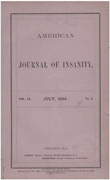Conflict between current knowledge about posttraumatic stress disorder and its original conceptual basis
Abstract
OBJECTIVE: The author's goal was to explore the historical, political, and social forces that have played a major role in the acceptance of the idea of trauma as a cause of the specific symptoms of posttraumatic stress disorder (PTSD) and to discuss the impact that current research findings have had on some of the initial conceptualizations of the disorder. METHOD: The conceptual origins of PTSD are described, and the literature on the prevalence, longitudinal course, phenomenology, and neurobiology of PTSD is reviewed. RESULTS: Paradoxically, there are a series of findings that support the idea that PTSD is a distinct diagnostic entity, but these are different from those originally developed from psychosocial theory and stress research. CONCLUSIONS: PTSD has been a controversial diagnosis and is again at a vulnerable point. It is imperative that the field address how current findings challenge the original conceptualizations of this disorder so that the next generation of conceptual issues can be formulated.
Access content
To read the fulltext, please use one of the options below to sign in or purchase access.- Personal login
- Institutional Login
- Sign in via OpenAthens
- Register for access
-
Please login/register if you wish to pair your device and check access availability.
Not a subscriber?
PsychiatryOnline subscription options offer access to the DSM-5 library, books, journals, CME, and patient resources. This all-in-one virtual library provides psychiatrists and mental health professionals with key resources for diagnosis, treatment, research, and professional development.
Need more help? PsychiatryOnline Customer Service may be reached by emailing [email protected] or by calling 800-368-5777 (in the U.S.) or 703-907-7322 (outside the U.S.).



